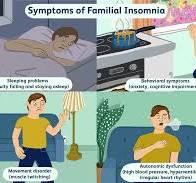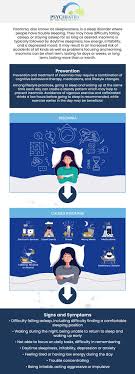The Mystery of Familial Insomnia: Understanding a Rare Sleep Disorder
Familial insomnia is a rare and mysterious sleep disorder that affects a small number of families worldwide. This hereditary condition is characterized by the progressive inability to sleep, leading to severe insomnia and other neurological symptoms.
Individuals with familial insomnia typically experience difficulty falling asleep, disrupted sleep patterns, and an overall deterioration in their ability to rest. As the disorder progresses, patients may also exhibit cognitive decline, hallucinations, and autonomic nervous system dysfunction.
One of the distinctive features of familial insomnia is its genetic component. The condition is caused by a mutation in the PRNP gene, which plays a role in regulating normal sleep-wake cycles. This genetic abnormality disrupts the production of a protein called PrPC, leading to the accumulation of misfolded proteins in the brain.
Diagnosing familial insomnia can be challenging due to its rarity and complex nature. Medical professionals often rely on a combination of clinical evaluation, genetic testing, and neuroimaging techniques to confirm the presence of the disorder.
Unfortunately, there is currently no cure for familial insomnia. Treatment options focus on managing symptoms and improving quality of life for affected individuals. This may involve medications to address sleep disturbances, cognitive therapies to support mental function, and lifestyle modifications to promote overall well-being.
Research into familial insomnia continues as scientists strive to unravel the mechanisms underlying this enigmatic disorder. By gaining a deeper understanding of its causes and progression, researchers hope to develop more effective treatments and ultimately find a cure for this rare form of insomnia.
While familial insomnia remains a challenging condition with limited treatment options, ongoing advancements in medical science offer hope for individuals and families affected by this mysterious sleep disorder.
8 Tips for Managing Familial Insomnia: Achieve Better Sleep
- Maintain a consistent sleep schedule
- Create a relaxing bedtime routine
- Avoid caffeine and heavy meals before bedtime
- Keep the bedroom dark, quiet, and cool
- Limit exposure to screens before bed
- Practice relaxation techniques like deep breathing or meditation
- Exercise regularly but not close to bedtime
- Seek professional help if experiencing persistent sleep issues
Maintain a consistent sleep schedule
Maintaining a consistent sleep schedule is crucial for individuals with familial insomnia to help regulate their disrupted sleep patterns. By going to bed and waking up at the same time every day, individuals can train their bodies to establish a routine and improve the quality of their rest. Consistency in sleep timing can also support the body’s natural circadian rhythm, promoting better sleep hygiene and potentially alleviating some of the symptoms associated with this rare sleep disorder.
Create a relaxing bedtime routine
Establishing a calming bedtime routine can be particularly beneficial for individuals with familial insomnia. By creating a consistent and relaxing pre-sleep ritual, such as reading a book, taking a warm bath, or practicing gentle yoga, you can signal to your body that it is time to unwind and prepare for rest. This routine can help reduce anxiety and stress levels, making it easier to transition into a peaceful state conducive to sleep. Over time, incorporating relaxation techniques into your nightly routine may contribute to improved sleep quality and overall well-being for those affected by familial insomnia.
Avoid caffeine and heavy meals before bedtime
To manage familial insomnia effectively, it is crucial to avoid consuming caffeine and heavy meals close to bedtime. Caffeine is a stimulant that can disrupt sleep patterns and make it difficult to fall asleep, exacerbating the symptoms of insomnia. Similarly, heavy meals can lead to indigestion and discomfort, making it challenging to relax and drift off into a restful sleep. By prioritizing a light and healthy evening routine that excludes caffeine and heavy foods, individuals with familial insomnia can create a conducive environment for better sleep quality and overall well-being.
Keep the bedroom dark, quiet, and cool
To manage familial insomnia effectively, it is crucial to create a sleep-conducive environment in the bedroom. Keeping the room dark, quiet, and cool can help promote relaxation and signal to the body that it is time to rest. Minimizing light exposure, reducing noise disturbances, and maintaining a comfortable temperature can all contribute to improving sleep quality for individuals affected by familial insomnia. By optimizing these environmental factors, individuals may find it easier to fall asleep and stay asleep throughout the night, potentially alleviating some of the symptoms associated with this rare sleep disorder.
Limit exposure to screens before bed
Limiting exposure to screens before bed is particularly crucial for individuals with familial insomnia. The blue light emitted by electronic devices such as smartphones, tablets, and computers can interfere with the production of melatonin, a hormone that regulates sleep-wake cycles. By reducing screen time before bedtime, individuals with familial insomnia can promote better sleep quality and improve their overall restorative rest. Establishing a relaxing pre-sleep routine that excludes screen usage can help mitigate the disruptive effects of blue light and support a more conducive environment for falling asleep naturally.
Practice relaxation techniques like deep breathing or meditation
To help manage the symptoms of familial insomnia, it is beneficial to incorporate relaxation techniques such as deep breathing or meditation into your daily routine. These practices can help calm the mind, reduce stress levels, and promote a sense of inner peace, which may contribute to improved sleep quality. By dedicating time each day to engage in these relaxation methods, individuals with familial insomnia may find relief from sleep disturbances and experience a greater sense of overall well-being.
Exercise regularly but not close to bedtime
Regular exercise is beneficial for overall health and well-being, but when it comes to familial insomnia, it’s important to time your workouts wisely. Engaging in physical activity earlier in the day can help regulate your sleep-wake cycle and promote better sleep quality. However, exercising close to bedtime may have a stimulant effect on the body, making it harder to fall asleep. By incorporating regular exercise into your daily routine while avoiding late-night workouts, you can support healthy sleep patterns and potentially alleviate some symptoms of familial insomnia.
Seek professional help if experiencing persistent sleep issues
It is crucial to seek professional help if you are experiencing persistent sleep issues, especially in the case of familial insomnia. Consulting with a healthcare provider or sleep specialist can lead to an accurate diagnosis and appropriate treatment plan tailored to your specific needs. Early intervention and expert guidance can make a significant difference in managing familial insomnia and improving your overall quality of life.



